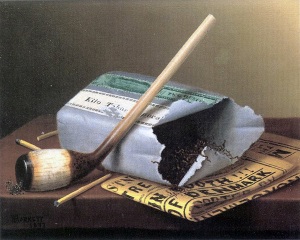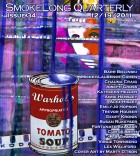One thing that strikes me is that this narrator/character seems to be very much a part of the story as a family member, and yet outside of the events of the story itself as a narrator. How for you (if at all) does the narrator’s presence and absence in this telling determine its direction? The questions we might ask of it?
This narrator, William Barret Travis Truitt, III, is the narrator of several of my previous fictional pieces going all the way back to “The Coat,” a short-short I published in Quarterly West during the mid-nineties (just out in Perseus Books’ new short-short anthology Sudden Flash Youth). The narrator closest to me autobiographically, Travis also narrates several longer projects I’m working on and many short-shorts, short stories and novel chapters I’ve published over the years.
Both a first-person narrator in his own stories and a third-person narrator in the stories of his mother, sisters, brothers, et al, Travis speaks for himself and for those who mostly can’t speak for themselves. Perhaps the only one who has sufficient understanding to speak for others in these stories, he still remains an unreliable narrator, as all first-person narrators are, at least on some level.
We never see the children speaking, or talking back, directly. What influences your decision, or the narrator’s decision, to make space for certain voices and not for others?
What happens when a parent raises a hand and says, “Don’t talk back” or “Shut up” or “Be quiet”? Some kids keep talking back, sure, but, like Maddie and Travis in other stories, they suffer the consequences of their rebellious words and actions. Most kids just learn not to talk.
I love the parallelism of this story’s closing moments. A father looks forward and chases a daughter looking backward, while a mother looks backward and shouts at a child looking forward. All these perspectives seem destined to collide in a pattern, somewhere down the road. “The car kept coming” and we never see it stop. Do you think of this story as continuing on some level? As having a particular future?
For me, the accident that’s foreshadowed isn’t necessarily literal (or inevitable). The outcome of the accident—if there is one, and certainly I leave it up to the reader to decide what happens next—is less important to me than the dramatic moment you speak of, frozen in time like the man chasing the woman in Keats’ “Ode on a Grecian Urn.” Chekhov suggests that the best stories are less successful at answering compelling questions than at asking them, questions that don’t have easy answers. For me, it’s enough to create a mirroring image that raises the kinds of question you raise.
“Broken Bow” is one in a series of stories about corporal punishment, yes? Can you tell us more about the project?
Tentatively entitled The Doppler Effect, the collection’s a few stories away from being finished, structured like a layer cake, long stories like the cake itself with short-shorts in between, like layers of icing.
Though I wrote the story later, the kernel of this story came to me when I taught at the University of Alabama, writing stories about corporal punishment as I read books by Alice Miller, a German psychiatrist who traced with great compassion the “poisonous pedagogy” that created men as different as Hitler and Kafka. A common practice in the Deep South, often practiced by religious fundamentalists who believe it’s not just okay but their God-given duty to hit their kids, corporal punishment is, I believe, one of the core hidden values of a prevalent “poisonous ideology” in the U. S.; “family values” like these have transformed the contemporary neo-conservative movement into a potent and destructive force.
The story’s kernel began in a single moment:
At a literary event in Montgomery in the mid-nineties, I sat at a huge dining room table in one of the Alabama state capital buildings, talking to a woman about my research into the long-term effects of corporal punishment in homes and schools. A deep-south Republican with the mellifluous drawl of a southern belle in the Junior League, she wore a fusty, stiff-looking fox stole I assumed she’d been storing in an attic for years. She was there, I suppose, for her money, her “support” of the arts.
“Honey, you have to spank kids,” she said, smiling at me like the stiff, glass-eyed fox biting its own tail around her neck. “If you don’t, you lose control. You know, spoil the rod and spoil—”
“That quotation doesn’t come from the bible,” I said, having heard this nonsense a thousand times. “The bible’s not much of a handbook for childrearing anyway, do you think? The quotation comes from Samuel Butler’s Hudibris, a satirical poem about the Presbyterian church and its practices at the time, like corporal punishment. If you ask me, hitting your kids already means you’ve lost control. Of yourself.”
She frowned at me, the snooty professor, who as it turned out wouldn’t get tenure at the big university in Tuscaloosa for such radical ideas as that, praise God, and with a quick backhanded comment like a slap, she smiled again and said, in that patronizing, passive-aggressive way so many southerners have perfected, “Honey, do you have children?”
I looked down at the table. “No, ma’am, I don’t.” Trying to be polite.
“Then what could you possibly know about it?” She laughed like I wasn’t even qualified to speak in such matters and wouldn’t be until I’d suffered parenthood myself.
For some reason, though, I kept trying to talk to her like so many of the parents I’ve known in my own family who shame and hit their kids daily without much thought. But like my father whenever I’ve tried to discuss the subject with him, the woman became defensive, hissing at me like a cornered fox.
“What if your child ran out into the street?” she snapped, as if that rebuttal would somehow shut me up. “What would you do to make her stop? How would you teach her?”
“I wouldn’t hit her,” I said. “That much I know. She’d never come back to me again, whether she was in the street or not, and I wouldn’t blame her.”
But that was the end of the conversation. Without saying another word, the woman hissed again and turned to talk to the other person sitting next to her, and she never spoke to me again for the rest of the night.
What else are you working on?
I’ve spent the last five years building one of the country’s first online MFA programs. Now that it’s become successful, I’m focusing mostly on teaching and writing a compendium of narrative craft and a novel-in-progress. Occasionally, I return to stories and short-shorts for my second story collection on corporal punishment, which seems to have taken me forever to write. It’s been a damned hard book to write. Maybe one of these days I’ll finish it.



 The core workshop of SmokeLong Fitness is all in writing, so you can take part from anywhere at anytime. We are excited about creating a supportive, consistent and structured environment for flash writers to work on their craft in a community. We are thrilled and proud to say that our workshop participants have won, placed, or been listed in every major flash competition. Community works.
The core workshop of SmokeLong Fitness is all in writing, so you can take part from anywhere at anytime. We are excited about creating a supportive, consistent and structured environment for flash writers to work on their craft in a community. We are thrilled and proud to say that our workshop participants have won, placed, or been listed in every major flash competition. Community works.